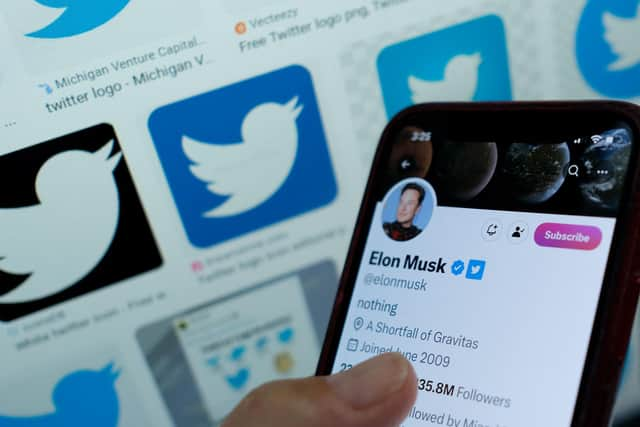Twitter's blue tick: Why Elon Musk was right to end old 'lords and peasants' system – Alastair GJ Stewart
Elon Musk's grand plan for Twitter has been capricious, at best. His most recent move to remove the legacy blue tick of celebrities, journalists, politicians and persons of interest was met with general scorn. Twitter's iconic check marks were once status symbols of internet influence, with 300,000 verified users under the original system.
Musk criticised the elitist "lords" and "peasants" design and vowed to let anyone get a tick if they paid for it. The Twitter Blue subscription, which gets you verified, allows you to edit tweets, write tweets with more than 280 characters, and raises your profile in results and reply rankings.
Advertisement
Hide AdAdvertisement
Hide AdMusk was right – Twitter had become a caste system. Who precisely was authentic and of public note was another way of asking who was worth listening to. The year 2016 was the death of Twitter, as we like to think we remember it, and it had nothing to do with Musk. Instead, it was the prolific falsehoods of the Brexit campaign and the political gaslighting that helped put Donald Trump in the White House.
Spectacular claims and rampant paranoia populated Trump's initial presidential run. For the first time, Twitter, already a cesspit of anonymous comments and absurd claims, became the home of cognitive dissonance: 'official' accounts were spouting nonsense, and no media outlet, politician, or impartial organisation was free of the accusation they all had a secret agenda.
Blue-tick verification granted cultural attention and implicit approval to whatever anyone decided to put out on their social media. They were legitimised because they had a blue tick and not the other way around. Everyone has an opinion, an interpretation, a vested interest – but there are few who have the means to affect people en masse.
Trump was permanently banned from Twitter in January 2021 after the social media platform said the then-president violated its glorification of violence policy after repeatedly tweeting his support for the rioters who stormed the US Capitol building following his election defeat to Joe Biden.
How often are award ceremonies transformed into platforms for actors to launch a political or cultural opinion? The media and social media spiral out of control, obsessing over what these people say because of who they are and not the merits or absurdity of the statements they make. It is a congealment of self-promotion, with little fact-checking.


Politicians are not always correct, and some try to warp reality into their understanding, hoping that followers repeating the lie will somehow make it true. Legitimate opinions are no longer earned. They are bestowed by how many followers you have. If your typical celeb was sticking to make-up and movies, fine. But Twitter has energised a generation of affluent entertainers and nefarious power-seekers to comment on anything and everything.
Twitter has about 238 million monthly active users (making it the 14th most-used social platform in the world). Removing the automated legitimacy of the blue tick and replacing it with a straightforward purchase of authenticity is genius. Making everyone equally unimportant once again forces a degree of consideration as to whether they are worth listening to.
Behind the scenes, some newspapers, commentators, and journalists were fearful that the removal of legacy blue ticks would switch out the lights. How could people know who they were, if they were to be trusted and how to separate them from amateurish outfits?
Advertisement
Hide AdAdvertisement
Hide AdThe erosion of trust in print and digital media has been going on for years. Trump was a master at taking advantage of Twitter's blind spots. He turned it into his mouthpiece, providing his twittified version of the events, attacking traditional news outlets and driving his grassroots campaign – an ugly, messy business which remains unresolved.
In our post-truth world, there are only so many sources that are trusted completely. Taking this as a fact, more needs to be done to educate audiences about how to discern between fact and fiction and who can help them do it. This feels even more pressing as we sit on the cusp of an AI revolution that writes its own stories and makes its own news.
But while Musk has made a masterstroke – it’s not for the reasons he thinks. Few will buy his Twitter Blue product. The resulting challenge is that more consumers must ask who and why they trust someone online for their information. Credentials must be weighed up in a sea of choice without that blue tick to tell you it's at least partially legitimate because Twitter says so.
At the time of writing, Musk has backtracked to a degree. Some have their blue tick back – or he is paying for it personally, including LeBron James, William Shatner, and Stephen King. Other Twitter accounts with more than a million followers have had theirs re-instated without paying to subscribe.
But Musk should resist. In a tickless world, he might genuinely usher in societal change by forcing voters, news consumers and anyone who picks up their phone for information to think seriously about the who, what and, particularly, why they are going to someone for information.
As one colleague put it, the over-saturation of anyone with a phone becoming a de facto news network is not the problem. You can still spot Charles Dickens and William Shakespeare in a sea of pulp fiction. The challenge is reminding readers how to do it and what makes the classics great. Musk, in something bordering on genius, has made that first step.
Comments
Want to join the conversation? Please or to comment on this article.